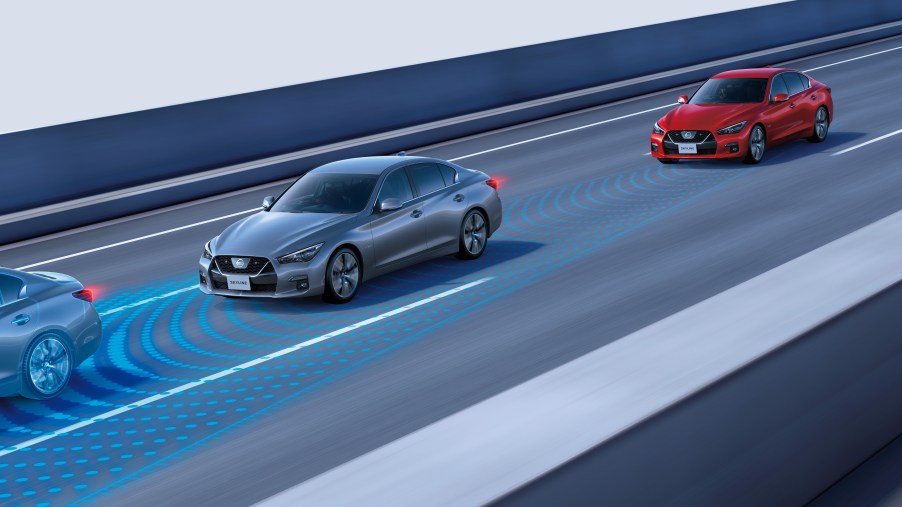
Is Adaptive Cruise Control Worth It? Absolutely
Many gearheads and car enthusiasts will scoff at convenient features like automatic transmissions and adaptive cruise control. They want to keep things simple and drive normally. But according to Doug DeMuro, they shouldn’t write off adaptive cruise control so fast. In fact, DeMuro thinks that it’s the best feature that you can get in a car, ever. Here’s why.
Traffic
According to DeMuro, having adaptive cruise control on his cars has changed his life because of what it does for him in traffic. Adaptive cruise control is a simple but advanced technology. It uses radars in your car to see the car in front of you, and then based on what that car’s doing, it’ll speed up or slow down your car up to a maximum speed that you can set.
So in a traffic setting where, without adaptive cruise control, you’d have to speed up and then slow down repetitively over and over again, adaptive cruise control becomes a big lifesaver. Rather than tediously press on the gas for a few seconds only to brake again, adaptive cruise control does all of that for you.
On top of that, in a lot of these dense traffic situations, you won’t have to actually use your steering wheel much since you don’t have to make many turns. So with adaptive cruise control in these situations, you can drive almost hands free. Don’t get DeMuro wrong though, you shouldn’t turn on adaptive cruise control and look at your phone the whole time, you still have to pay attention to the road.
However, with adaptive cruise control turned on while in heavy traffic situations, you basically don’t have to do much of anything. And if you’re in heavy traffic as often as DeMuro is, then adaptive cruise control also means that you won’t be tired by the end of your commute.
But not highways
DeMuro does caution though that adaptive cruise control isn’t useful at all for highways where there’s not much bumper-to-bumper traffic going on. If your car doesn’t have to come to a full stop often, then turning on adaptive cruise control just becomes worse than driving without it.
That’s because of the safety features that manufacturers built into the system. They wanted to make adaptive cruise control as safe as possible, so the safe cruising distance between you and the car that you’re following is massive.
It’s so massive in fact, that at regular highway speeds, DeMuro says that other people will just cut in front of your car because of how much open space there is. As a result, unless you really want adaptive cruise control on, driving regularly will just be faster and better overall while at highway speeds.
Caveat
One thing that DeMuro mentions to look out for when shopping for adaptive cruise control systems is whether or not it’s a full-range adaptive cruise control system. Some systems have a minimum speed limit and that minimum speed limit makes it impossible to use the adaptive cruise control in heavy traffic as DeMuro described.
Obviously, if the adaptive cruise control system can’t do what DeMuro loves it for, then it’s not worth it. He says that your best bet is to just try out the adaptive cruise control systems of cars to make sure they are truly full range.
On top of that, DeMuro stresses that you really have to do your research before buying it. Some adaptive cruise control systems, for example, won’t come to a full stop, and that will be extremely problematic in traffic and on highways.
Adaptive cruise control isn’t a futuristic and pricey technology too like semi-autonomous driving cars are. DeMuro mentions that there are cars that are about 7 years old that have this technology. Buying those cars is a much cheaper way to get access to adaptive cruise control than buying a brand-new one.



